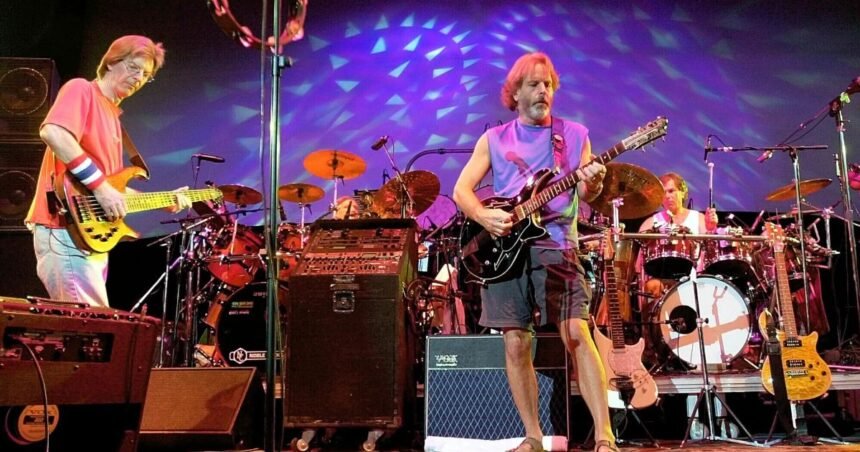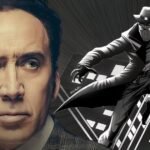The music community is in mourning as Phil Lesh, one of the founding members of the legendary band Grateful Dead, has passed away at the age of 84. The news was confirmed on Friday through a heartfelt message on his official Instagram account.
“Phil Lesh, bassist and founding member of The Grateful Dead, passed peacefully this morning. He was surrounded by his family and full of love. Phil brought immense joy to everyone around him and leaves behind a legacy of music and love. We request that you respect the Lesh family’s privacy at this time,” the statement read.
Read More: Nicole Kidman Babygirl
Phil Lesh, bassist and founding member of countercultural rock band The Grateful Dead, has died. He was 84 years old. His family posted the news on Lesh’s official Instagram page.
Born in Berkeley, Calif., in 1940, Lesh was initially drawn to classical music. He played violin as a child before turning his attention to the trumpet, which he studied throughout high school and his time at the College of San Mateo. In the early ‘60s, he met banjo player Jerry Garcia, who later asked him to join his rock band, The Warlocks, as their bassist — an instrument Lesh did not play. He accepted nonetheless, and in 1965, The Grateful Dead was born, with Lesh finding his footing in the improvisation-driven group as he went.
“On a day-to-day basis, the psychic pivot to the Dead is Phil Lesh, the most aggressive purist, the anti-philistine Artist,” wrote Grateful Dead biographer Dennis McNally in his 2002 book A Long Strange Trip: The Inside History of the Grateful Dead. “It is he who most often and most loudly demands that they dance as closely as possible to the edge of the nearest available precipice. Intellectual, kinetic, intense, he was once nicknamed Reddy Kilowatt in recognition of his high mental and physical velocity.”
A legacy of music and joy
Born and raised in the suburbs of San Francisco, California, Lesh began his musical journey with classical violin before discovering his passion for the bass guitar. In 1965, he helped form the Grateful Dead, a band that would go on to change the landscape of rock music and build a dedicated fanbase that spanned generations. Lesh’s innovative bass lines became a signature part of the band’s improvisational sound, blending rock, folk, blues, and psychedelic music.
Throughout his career, Lesh remained a driving force behind the Grateful Dead’s unique sound, helping the band reach iconic status. Their music resonated with fans not just across America but around the world. Some of their most beloved tracks include “Touch of Grey,” “Truckin‘,” “Casey Jones,” “Friend of the Devil,” and “Ripple.”
An enduring influence on american rock
The Grateful Dead’s influence on American rock music is undeniable. They played their final show on July 9, 1995, but their legacy has continued to live on through countless tribute bands, music festivals, and a devoted community of fans known as “Deadheads.” Lesh’s contributions to the band were pivotal, and he remained active in music even after the Grateful Dead disbanded. He continued to perform and tour with other projects, including his own group, Phil Lesh & Friends, keeping the spirit of the Dead alive for new audiences.
Despite Lesh’s passing, his influence and the joy he brought to fans will not be forgotten. The music world remembers him not only as a talented bassist but as a warm and generous figure who brought people together through his art.
Beginnings
Also trained on the violin and trumpet, Lesh eventually earned second chair in California’s Oakland Symphony Orchestra while still a teen.
Lesh was driving a mail truck and working as a sound engineer for a small radio station in 1965 when Garcia asked him to play bass for a fledgling rock band, then known as The Warlocks.
After getting a feel for the instrument and studying with Garcia, the pair would often trade off on who would lead the melody of the songs they created, thereby establishing one of the many specialties the Dead would become known for – long and improvised passages that meant no two live performances of a certain song were ever alike.
“It’s always fluid, we just pretty much figure it out on the fly,” Lesh said during a rare interview with the AP in 2009. “You can’t set those things in stone in the rehearsal room.”
Although mostly known for his legendary and freestyle bass playing, Lesh composed music for some of the band’s most beloved songs, and also occasionally provided vocals. Among those tracks were “Pride of Cucamonga,” “Unbroken Chain” and “Box of Rain.”
In 2002, Lesh along with Weir observed what it felt like for the history-making group to perform onstage.
“It’s when the pipeline is open, and that eternal moment – as he is describing – which is where music really lives, is open to us and we become the vessel to which that passes, so in a way music is about bringing eternity to time,” Lesh told CNN at the time, in response to Weir’s remarks.
The band became known for its legendary live performances, blazing the trail for other popular groups to follow, like Phish.
Regarding the Dead’s staunch fanbase and following, Lesh said in 2002 “that it’s the community that really generates this music, and we are just there on the receiving end to tap into the pipeline and feed it back to them, maybe at a higher level. So we get it from them, and we give it back to them.”
Later years

The Dead will be honored in January at a benefit gala ahead of the Grammy Awards in Los Angeles. The band was honored with a lifetime achievement award from the Recording Academy in 2007.
“It’s paradise. At that moment, I’m not really there. And no one is. We are the music, and our personalities as such really cease to exist at all. We’ve been subsumed into the greater personality of the group mind, that’s what’s been created. That’s what’s created when we are creatively improvising, and the flow is really happening.
When we are actually channeling, we are opening that pipeline to another reality that speaks to us. And we are acting as transformers, and we have to step that down into musical thought. But this is not something you can do consciously, learn how to do or be taught. It’s just something that happens to you when the stars are aligned properly and when your individual consciousness is open enough.”
Remembering Phil Lesh
While the cause of death has not been disclosed, it is clear from the statements and messages pouring in that Lesh was surrounded by love and family during his final moments. Fans, friends, and fellow musicians have expressed their condolences, sharing memories and tributes to honor the life of a man who dedicated himself to the joy of music.
Over the Dead’s decades of musical longevity and reinvention, Lesh went on to sing lead vocals on some of the band’s most memorable songs, including “Box of Rain” off the 1970 album American Beauty, which he composed alongside longtime Dead lyricist Robert Hunter, and “Unbroken Chain” off 1974’s From the Mars Hotel.
After Garcia’s death in 1995, Lesh reunited with fellow band members Bob Weir and Mickey Hart and keyboardist Bruce Hornsby to tour as The Other Ones, and later, The Dead. He also released albums with his own group, Phil Lesh and Friends, and for a decade operated a popular venue called Terrapin Crossroads in San Rafael, Calif. There, Lesh often performed alongside his sons, Grahame and Brian. Though Terrapin closed in 2021, the Lesh family continued to champion live music in Northern California, most recently organizing a festival called Sunday Daydreams, which Lesh headlined this past summer.




